lundi, 13 octobre 2025
La métamorphose du corps humain au 21ème siècle
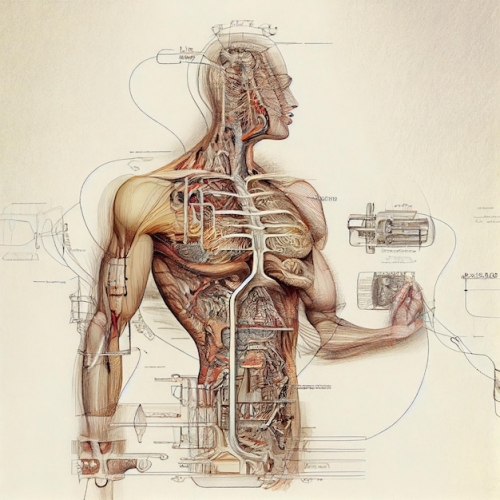
La métamorphose du corps humain au 21ème siècle
par Giuseppe Sapienza
Source: https://socialismomultipolaridad.blogspot.com/2025/10/la-...
Lorsque le capital, poussé par son besoin d’expansion, rencontre le corps humain, il le modifie de trois manières : comme produit, comme moyen de production et comme marché en soi. Ce processus s’accompagne d’une marchandisation générale du corps humain et d’une métamorphose fonctionnelle : de l’être-corps à l’avoir-corps.
Le corps humain comme produit
En tant que marchandise achetée et vendue sur le marché de la production et de la consommation, le corps humain a toujours été limité par sa rigidité. Contrairement à de nombreux autres produits, le corps humain ne peut pas être modifié à volonté. Pourtant, c’est son mauvais état qui a préservé son humanité.
Aujourd’hui, la biotechnologie et l’intelligence artificielle semblent capables de franchir cette barrière.
La séparation du corps de l’identité individuelle a rendu possible la vente du corps humain non seulement aux autres, comme dans l’esclavage, la prostitution ou, en d’autres termes, le travail salarié, mais aussi à son propre propriétaire, qui, en interagissant avec lui-même, entre dans un cycle de création et de satisfaction de besoins comblés par les soins corporels, les traitements de beauté, la chirurgie, le fitness, etc. Ainsi, l’individu finit par devenir une sorte d’acheteur, d’utilisateur et de client de son propre corps. La biotechnologie peut élargir les possibilités du corps humain, compris comme produit, selon les besoins du marché, en identifiant de nouvelles parties spécifiques à améliorer, remplacer ou échanger ; et, à l’avenir, l’intelligence artificielle est capable de reproduire l’esprit de manière algorithmique, le séparant ainsi du corps. Dans cette perspective, n’importe quel esprit pourrait habiter n’importe quel corps, dans une sorte de marché immobilier du corps humain.

Le corps humain comme instrument de production
En tant qu’instrument de production, le corps humain a montré toutes ses limites depuis la naissance de la vie sociale. La marge d’amélioration structurelle est très différente. Les machines peuvent être modifiées, améliorées et remplacées indéfiniment, tandis que les humains restent inchangés depuis le jour imaginaire où ils se sont proclamés humains.
L’incapacité du corps humain à être modifié structurellement a laissé sa capacité productive osciller entre une marchandise inestimable hors marché et, au contraire, un produit sans marché et une marchandise de faible valeur.
Le corps humain comme marché en soi
Si l’on imagine le corps humain comme un lieu géographique où l’on achète et vend des biens comme des montres, des vêtements ou des bijoux, sa plasticité limitée représente un obstacle à l’expansion du capital car, si le marché des montres exige un troisième bras, l’humain ne peut s’en doter.
Le capital a tenté de contourner cette limitation par la multiplication des individus et l’augmentation conséquente de la population mondiale.

La façon dont, ces dernières années, le capital est allé au-delà des usages traditionnels du corps humain comme marché en soi (vêtements, mode, accessoires, produits pharmaceutiques, etc.) l’a vu s’immiscer dans le corps humain, donnant lieu à un marché du sang, des organes, et, plus récemment, du sperme et des ovules, et à la location d’utérus pour la reproduction.
Ces dernières années, les avancées technologiques ont permis la conception de médicaments personnalisés, la modification génétique, les nano-médicaments, la protéomique, les cellules souches et la biologie synthétique, qui promettent de faire du corps humain un marché aux possibilités immenses.
Le scénario le plus inquiétant est celui de l’homme du 21ème siècle totalement séparé de son corps, totalement marchandisé et soumis aux règles du marché.
Dans les perspectives les plus extrêmes de l’intelligence artificielle, le corps peut être habité, acheté et vendu comme un appartement, tandis que du point de vue de la biotechnologie, il peut être modifié à volonté, amélioré et intégré à des parties robotiques.
Dans cette perspective, la vieille phrase de Sénèque : « Celui qui est esclave de son propre corps n’est pas libre » prend un tout autre sens.
18:10 Publié dans Actualité, Philosophie | Lien permanent | Commentaires (0) | Tags : corps humain, corps, philosophie, actualité, problèmes contemporains |  |
|  del.icio.us |
del.icio.us |  |
|  Digg |
Digg | ![]() Facebook
Facebook
mardi, 23 avril 2024
L'obsession du corps et la beauté volée
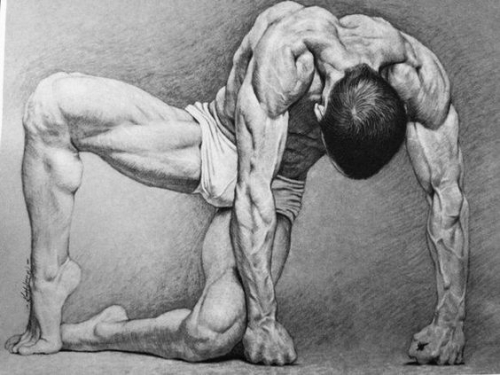
L'obsession du corps et la beauté volée
par Gennaro Malgieri
Source: https://www.destra.it/home/lossessione-del-corpo-e-la-bellezza-rubata/
Le beau temps arrive. La nudité apparaît partout où un espace rassemble des adeptes obséquieux et observateurs. Et les membres prennent possession des esprits. Avec l'arrivée du printemps, il devient presque obligatoire de se mettre en forme.
Et l'obsession du corps nous enferme dans la prison du narcissisme.
Ayant perdu d'autres repères, il ne nous reste que la matérialité la plus proche pour nous reconnaître dans un idéal. Notre idéal de contemporains flétris, c'est le soin épuisant, l'exhibition vulgaire, le langage indécent (et parfois indéchiffrable) du corps. Hors de lui, même discours s'il n'y est pas lié, rien n'existe car rien n'est si tangiblement vrai.
C'est ainsi qu'à la religion du corps nous nous sommes consacrés comme des adorateurs de la liquidité sociale dans laquelle ont déjà fait naufrage toutes les idées qui transcendent la matérialité la plus noble parce qu'elle est plus nôtre : celle des membres qui bougent, qui mentent, qui sont admirés, qui suscitent la répulsion, qui enflamment les désirs, qui éteignent les enthousiasmes, qui élèvent jusqu'à l'incroyable vertige le pouvoir d'écraser les autres membres.
Bref, le corps est tout. Il est le démiurge de la modernité. Il est le lieu-événement où se célèbrent les triomphes de la création et de la décomposition, de la mort et de la résurrection, du dynamisme et de l'ataraxie. Il est le symbole et la représentation de la réussite. Ce n'est que dans le corps que la vie prend un sens, a un sens.
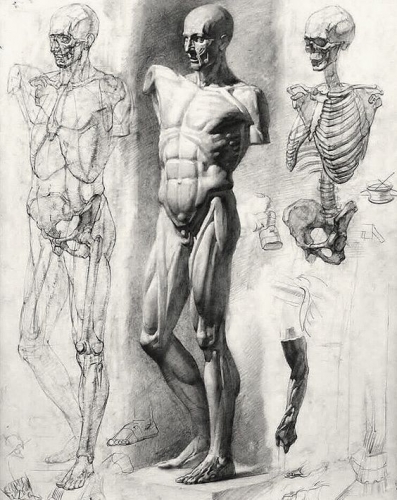
Et le corps, avec sa fausse majesté, couvre la dureté de notre existence en l'adoucissant par la transfiguration de la beauté dans la possession charnelle.
Ainsi tout se recompose dans le corps qui parle de lui-même, sans avoir besoin de sons ni de mots. Son expression est inscrite dans son essence. Ainsi la publicité l'utilise, les hommes et les femmes le commercialisent, l'industrie de la consommation s'en sert.
La sensualité est exaltée avant même que l'été brûlant ne donne le coup d'envoi de la course aux fausses transgressions qui se consomment partout où le corps peut être vu en faisant semblant de ne pas être vu. Et il fait des clins d'œil, il séduit, il tente. C'est une machine, un mécano. Sans âme, désormais sous l'apparence des réalités qu'elle reproduit à l'infini. Ce n'est pas, bien sûr, le corps des saints, des poètes, des héros, des artistes, des tyrans, des mendiants, des naïfs, des purs et des méchants. Ce n'est que le corps : une chose. En effet, la Chose.
Dans les corps massacrés, il n'y a que de la matière inutile. Dans les corps dépouillés, il n'y a que l'induction à la déprédation. Dans les corps aspergés d'onguents et exposés au soleil ou manipulés par d'habiles reconstructeurs, on ne voit que la personnification de l'abandon.

Ils longent les chemins de l'apparente immortalité, des corps privés de profondeur, comme des papiers qui absorbent nos cauchemars et nos rêves au bord de routes qui révèlent le pouvoir de séduction, mais ne l'offrent pas au voyageur qui tue ses propres désirs dans la course effrénée vers la violation du mythe qui, même s'il y parvient, ne le satisfera pas parce que le corps désiré, poursuivi, obtenu, est celui de tous, poursuivi, obtenu, c'est le corps de tout le monde, ce sont tous les corps du monde figés dans un stéréotype qui fournit beaucoup d'attrait, beaucoup de nudité, beaucoup plus de sourire niais, et enfin un appel constant, incessant, nauséabond à abuser de ce que l'affichage, la télévision, le cinéma, l'internet proposent généreusement.
Mais c'est l'illusion qui éclaire nos désirs. Pensez-y : le corps est mort. Nous devenons des automates en nous réduisant à la matérialité qui devrait remplir et satisfaire nos jours et nos nuits.
Nous marchons au milieu de cadavres épars et inanimés, précisément parce qu'on ne demande rien d'autre aux corps que de se montrer, quel que soit leur but. Et s'il était une fois un temple, comme on le disait, aujourd'hui ce n'est même plus un paillasson.
L'offense que nous nous faisons à nous-mêmes se résume à notre addiction aux stéréotypes charnels qui semblent tout dominer : la politique, l'économie, la culture, l'art, la guerre (mais c'est de l'histoire ancienne).
Et la possession du corps, des corps, de la plus grande quantité de corps est le signe reconnaissable d'un pouvoir d'autant plus fort que les cris des corps souillés, prostrés, profanés, désirés, aimés, utilisés, jetés, usés, montent de la terre.
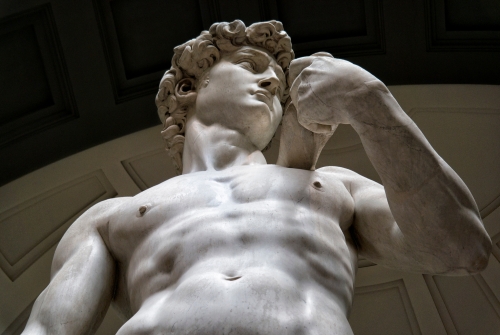
Il était une fois la beauté du corps. Elle racontait les dieux enivrés et amoureux ; elle racontait la solitude resplendissante des mystiques assoiffés d'éternité ; elle racontait les poètes errant sur les chemins de l'esprit et de l'amour ; elle racontait les soldats et les chevaliers défendant les civilisations ancestrales ; elle racontait les guerriers et les jeunes filles, les vieillards et les vieilles femmes, les voleurs et les bienfaiteurs. Je ne sais pas où est passée cette beauté des corps qui étaient des tours éburnéennes, mais je crois que personne ne le sait. Reviendra-t-elle ? Peut-être, du moins on l'espère. Mais quand la chute devient tonitruante, on ne sait plus où se réfugier pour ne pas voir, pour invoquer la cécité, pour souhaiter que le soleil s'éteigne, que la lumière défaille, que le désespoir nous étouffe. Car tout est plus acceptable que la résignation à la fin de la beauté. Et le corps, pour l'essentiel, est réduit aujourd'hui à ce chant funèbre que même un miracle ne saurait transformer en symphonie.
A moins que Dieu ne réapparaisse et ne restitue au corps l'âme somptueuse et discrète qui s'en allait le narguer, pour voir, en secret, ce qu'il deviendrait en le quittant.
Voilà : nous savons maintenant. Nous qui lisons les journaux, qui regardons la télévision, qui allons au cinéma, qui fréquentons les théâtres, qui nous tenons parmi les gens, qui nous nourrissons de publicité. Nous savons que les corps sont des apparences. Des images défraîchies, autrefois aussi séduisantes que les visages de ceux qui les ont créées. Que reste-t-il d'un regard dans lequel on ne peut lire une émotion ? Quel est l'effet d'une bouche figée dans le silence ? Quelle est la signification d'un geste qui rappelle une consommation banale qui pourrait être suscitée par d'autres éléments, mais pas nécessairement par un corps ? Rien. Et c'est l'annulation de la personne devenue objet qui devient essentielle à nos vies hébétées où rien n'est là où il devrait être. Nous regardons à l'intérieur de nous-mêmes et nous ne voyons plus rien. Et nous nous demandons : mais comment, il y a encore peu de temps, je me parlais à moi-même et maintenant je vois le vide en moi ? Oui, pour nous reconnaître, nous avons besoin du miroir. Et ce que nous y voyons reflété, c'est ce que les autres veulent voir de nous. Tout sauf la beauté.

Je vais manquer de temps, mais je continuerai à aimer le corps comme le tabernacle de l'âme. Et je l'honorerai. Je prierai pour lui. Je le soutiendrai lorsqu'il sera faible. Et à la fin, je demanderai qu'une bénédiction descende sur lui. Et, je l'espère, la dernière image qui passera devant mes yeux sera d'une beauté infinie qui m'emmènera là où les images se pressent et les rencontres s'épaississent. Là où les âmes caresseront les corps qu'elles ont habités, les reconnaissant enfin pour ce qu'ils sont. Alors, la pandémie qui nous a assaillis et volé notre beauté prendra fin. Si Dieu le veut.
11:48 Publié dans Philosophie | Lien permanent | Commentaires (0) | Tags : philosophie, corps, beauté |  |
|  del.icio.us |
del.icio.us |  |
|  Digg |
Digg | ![]() Facebook
Facebook
dimanche, 18 novembre 2012
Overcoming the Bourgeois Mind & Body
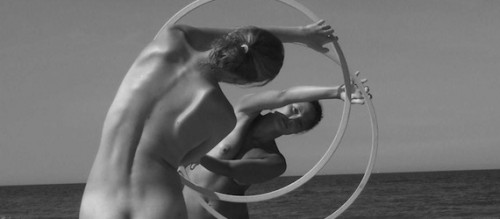
Overcoming the Bourgeois Mind & Body
By Marl Dyal and Nick Fiorello
Ex: http://www.counter-currents.com/
“I walk among these people and keep my eyes open; they have become smaller and are becoming ever smaller: but this is because of their teaching on happiness and virtue. So much kindness, so much weakness I see. So much justice and pity, so much weakness. Round, righteous, and kind they are to one another, like grains of sand are round, righteous, and kind to one another.” – Zarathustra[1]
This discussion of the relationship between bodily and conceptual vitality began with two historical topics: the “spiritual eugenics” of Fascist Italy [2] and the “proper eugenics” of Lycurgan Sparta [3]. In the former, we saw that the Fascists desired to transform weak bourgeois bodies into bodies capable of bearing the physical, moral, and intellectual weight of the Fascist revolution, thus making physiology central to Fascism. In the latter, we saw Lycurgus demand that Spartans overcome societal decadence by transforming their expectations, and ownership, of their bodies.
The Spartan example, while revealing the lengths necessary for bodily and societal transvaluations of decadent behaviors and values, demonstrated as well the power of the Greek ideal. This ideal, which maintains the interconnectedness of the mind/soul and what they do with the body, led to the simultaneous education of mind and body. Lycurgus promoted character and noble, masculine traits, while limiting avenues to elite status that did not involve the ennoblement of the mind through devotion to warfare and sacrifice for Sparta.
Even in Plutarch’s description of Lycurgan Sparta, written some 600 years after Lycurgus transformed his state and people, one sees the naturalness of the Greek ideal. For nowhere does Plutarch question the idea that ethics and character have something to do with the state of the body. Plutarch was not even surprised that Lycurgus was able to sell such a harsh regime to his people. Perhaps this is just deduction on Plutarch’s (and our own) part. Lycurgan Sparta happened. If there were casualties amongst the Spartan people – after all, moderns are culturally programed to seek out dissent when lofty and rarifying ideals are “imposed” on a people – then so be it. Greek and Roman history, to say nothing of values, have little concern for failures; but instead open up vast spaces of ennoblement and enrichment through examples of greatness – the very point of Plutarch’s Lives.
The Lycurgan view of life, with human aspirations focused on one ideal, is certainly heroic in the Homeric sense of the word; for what was ultimately to become praiseworthy in Greek thought — Platonic harmony and leisurely self-reflection — was in Sparta dismissed as decadent. Competition, strife, power, action, and worldly achievement were Olympian values shared by Lycurgus and the Homeric heroes. And it could be argued that the Spartans and Homer’s heroes are amongst a small handful of Western men who have achieved immortality – something to consider when perusing modern scientific literature motivated by a stark fear of death. While heroism and glory (kleos) are not the point of this paper, they are implicit in Lycurgus’ reforms, for the actions that guaranteed Spartan nobility culminate in them.
Our attention now turns to postmodern science, specifically New Biology and its promotion of epigenetics as a corrective to Newtonian/materialist genetics. In doing so, however, we must be clear: while Mussolini, other Fascist thinkers, and Lycurgus placed the body on the frontlines of a war between flabby decadence and hard nobility, postmodern science tends to understand what is best for the body as what is best for bourgeois man. Thus, we must read its theories and conclusions against the applications assumed by the bourgeois scientists themselves; for harshness, our goal, is not an ideal shared by New Biology, even as its methods demonstrate how transformative it might be for modern man. In other words, we no longer have the luxury and honor of being ennobled through research. In another sense, we have switched from saying Yes to saying No.
Body and Environment
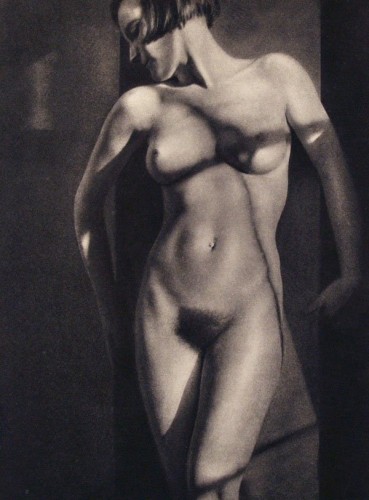 As the Zarathustra epigraph makes clear, Nietzsche understood a direct relationship between the mind, body, and environment. Although he will be discussed thoroughly in the next paper in this series, suffice it to say that Nietzsche understood the human as a series of types created in conjunction with the moral and societal needs of the various forms of human life. Modern men, as he says above, are being made weak by the soft, comfortable, and egalitarian life promised by bourgeois modernity. And while the context was different for Lycurgus, both Fascist Italy and Lycurgan Sparta shared Nietzsche’s assumption about man and society. Epigeneticist (and New Biologist) Bruce Lipton does as well, explaining succinctly that the environment exerts some control over the activity of human genes.[2]
As the Zarathustra epigraph makes clear, Nietzsche understood a direct relationship between the mind, body, and environment. Although he will be discussed thoroughly in the next paper in this series, suffice it to say that Nietzsche understood the human as a series of types created in conjunction with the moral and societal needs of the various forms of human life. Modern men, as he says above, are being made weak by the soft, comfortable, and egalitarian life promised by bourgeois modernity. And while the context was different for Lycurgus, both Fascist Italy and Lycurgan Sparta shared Nietzsche’s assumption about man and society. Epigeneticist (and New Biologist) Bruce Lipton does as well, explaining succinctly that the environment exerts some control over the activity of human genes.[2]
Lipton is working in the shadow of Jean Baptiste de Lamarck, the evolutionist who believed that individual traits acquired as a result of environmental influence could be passed on transgenerationally. In fact, this basic idea of Lamarck, known as “soft inheritance,” forms the very basis of epigenetic science. While Lamarck was influential in the mid-19th Century (and again in the mid-20th Century), being read with enthusiasm by many of the leading physiologists of the day, his work was discredited amongst evolutionists after the successful publication of Darwin’s The Origin of Species in 1859. Many of Darwin’s assumptions, such as the responsibility of passed hereditary factors for controlling offspring traits, were crafted in direct contradistinction to Lamarck. And even though Darwin came to lament the lack of attention paid to environmental factors in the modification of genetic material, modern genetic science came to be dominated by the “determinism” inherent in The Origin of Species.[3]
While “genetic determinism” is given a negative connotation in a postmodernity (popularly) committed to the denial of genetic primacy – at least when racial or gender proclivities for excellence or mediocrity are advanced – in the (genetic) scientific community it has been a major control on methodologies and assumptions. Classical genetics, especially the work of Thomas Morgan and the re-discovered work of Gregor Mendel, was essentially crafted within the conceptual universe of Darwinian natural selection, seeking to identify the hereditary material believed to control organic life.
Crick and Watson believed they found that material in 1953 when they discovered DNA, even going so far as creating the Central Dogma, or primacy of DNA. The primacy of DNA provides the logic for genetic determinism, reducing organic life to a series of DNA-encoded proteins that represent the primary determinant of an organism’s traits.[4] But by the early 21st century, the Human Genome Project (henceforth HGP) cast doubt on the primacy of DNA, demonstrating that there are not enough genes to account for human complexity. While much of 20th-century science assumed a 1-to-1 ratio of genes and the proteins constructive of the human body – which would amount to roughly 120,000 genes – the HGP found instead only 25,000; leaving unaccounted 80% of the genes presumed necessary for human life and behavior.
Geneticist David Baltimore interpreted the HGP results as a call to the primacy of environment,[5] which brings us to epigenetics. Epigenetics, or “control above genetics,” offers an explanatory model capable of answering the questions raised by the HGP. Recent epigenetic research has established that DNA blueprints passed down through genes are not set in stone at birth, but instead respond to their environment. In other words, genes are not destiny.[6] Environmental influences, “including nutrition, stress, and emotion,” can modify those genes, without changing their basic blueprint.[7]
By focusing on the regulatory chromosomal proteins to which DNA strands attach themselves, epigeneticists have been able to discern the physiologic functions of chromosomes independent of DNA, suggesting a more sophisticated flow of information through human cells. Biology, according to this thinking, starts with an environmental signal, then goes to a regulatory protein and only then goes to DNA, RNA, and the end result, a protein.[8]
Because scientific research focused primarily on the DNA blueprint, the contributions to human heredity made by the environment have gone largely unnoticed.[9] These contributions manifest themselves primarily through impulses that activate hereditary diseases like cancer. Genetic predispositions, in other words, are not in themselves causes of disease. In fact, only 5% of those suffering from cancer or cardiovascular disease can attribute their affliction to heredity.[10] But if the environment can trigger disease, it can also prevent disease.
The fluidity and ultimate responsiveness of the genome to environmental factors – be they internal or external to the body – actually brings us back to Mussolini, Lycurgus, and Nietzsche. For while they were not in a position to understand the body in the terms of postmodern science, their insistence on a relationship between body and conception is scientifically justified by epigenetics – especially when we consider the physiological consequences of quantum science.
Cell, Body, and Mind
Einstein revealed that we do not live in a universe with discrete, physical objects separated by dead space. The universe is one indivisible, dynamic whole in which energy and matter are so deeply entangled that it is impossible to consider them as independent elements.
When scientists study the physical properties of atoms, such as mass and weight, they look and act like physical matter. However, when the same atoms are described in terms of voltage potentials and wavelengths, they exhibit the qualities and properties of energy waves; leading to the conclusion that energy and matter are one and the same.[11] For epigeneticists, this model of energy and matter has allowed the mind and body to be reunited, with several scientists – among them Dr. Lipton – seeking to explain how thought, as the energy of the mind, controls the body’s physiology. Lipton’s work has actually demonstrated a direct relationship between thought and the behavior of regulatory chromosomal proteins, making it possible to infer an individual’s ability to override genetic programming.

Each cell is an intelligent being that can survive on its own, as scientists demonstrate when they remove individual cells from the body and grow them in a culture. Likewise, each individual cell performs the biological functions performed by each of our body’s systems. Each eukaryote (nucleus-containing cell) possesses the functional equivalent of our nervous system, digestive system, respiratory system, excretory system, endocrine system, muscle and skeletal systems, circulatory system, integument (skin), reproductive system and even a primitive immune system, which utilizes a family of antibody-like “ubiquitin” proteins.[12]
Like humans, single cells analyze thousands of stimuli from the microenvironment they inhabit. Through the analysis of this data, cells select appropriate behavioral responses to ensure their survival. Single cells are also capable of learning through these environmental experiences and are able to create memories, such as immunities, which they pass on to their offspring.[13]
Lipton believes that it is possible to explain the behavior of humans through better understanding of individual cells. And putting it simply, the human being is just a collection of trillions of cells, each of which is aware of, and responsive to, the environment – including the body’s energy. Ultimately, Lipton points to the primacy of this energy in controlling cell behavior. And, somewhat predictably given his postmodern American proclivities for ecumenicalism, he points to “perception” as a major influence on the direction and contours of bodily energy.[14]
If we believe that there is something useful in epigenetics and the results of Lipton’s cell studies, and we do, then it is certainly not the same use-value assumed by Lipton himself. As quoted above, Lipton is comfortable with the idea that the body and each of its cells can be cared for by controlling “nutrition, stress, and emotion.” However, nowhere in his work is the positive value of the bourgeois form of life questioned in this regard. Dr. Lipton (and certainly not only him) seems to assume that the normalcy of sloth, gluttony, and cultural philistinism that supplies the content of contemporary American life is of positive value to the natural human body, assuming that one properly manages these three environmental factors.
Harshness Destroys Decadence
Epigenetic research points to the fluidity of mass and energy. This fluidity gives us a scientific way of understanding the Greek ideal, as well as a scientific way of explaining what Yukio Mishima understood instinctively about the body: that without resistances, we become spiritually and bodily flaccid and docile.[15] In the spirit of Mishima’s Sun and Steel, we will leave aside “nutrition, stress, and emotion,” at least as bourgeois scientists assume them, and focus instead upon exercise and its role in creating and sustaining vitality. In so doing, we will also demonstrate the great potential of epigenetics as a tool directed against the bourgeois form of life.
Mishima’s attack on modernity was muscularly motivated. In addition to his conceptualization of heroism and the heroic life – both of which required muscles to be achieved – Mishima understood a physiological relationship between words and bodies. The former, he said, are figuratively projected onto the latter; and the body, as the natural repose of words, concepts, and (epistemic) grammatical systems, is a better gauge of a man’s “spiritual” state than his thoughts.[16] This is because the body, according to Mishima, has a closer relationship with ideas than the “spirit.”[17]
Thus, the body will conform to any ideal one holds as its goal. In the Homeric world, nobility required muscle, because heroism was the path to nobility. But taking an epistemic (or a writer’s) approach to Lycurgus’ idealization of heroism, Mishima explained that, without words, bodies would never have conformed to a Greek ideal.[18] Nonetheless, Mishima also followed Lycurgus’ path through physicality to the highest – most ideal – of consciousness. Steel, as he said, teaches what words cannot.[19]
Like Nietzsche, who also used physiological models of consciousness, Mishima’s thoughts on the body truly take flight when one moves from the individual body to the environment in which it is given meaning. Generally speaking, Nietzsche understood that human bodies would reflect the moral and ethical systems in which they lived. Mishima takes a similar approach, understanding that bodies reflect the ideals of the day (in question). Thus, while the Greeks idealized strength and courage – enough so to make these among the most valuable ideals to which a man may aspire – modernity idealizes passive judgment and resigned docility. As such, heroism is made an enemy of the people, history is stripped of singular examples, and men are taught to live in coded systems through which the possible is popularized.[20] Muscles, the basis of heroism, have no value and are resigned to extinction.[21]
In the decadent modern environment described by Mishima, fitness is not the ideal; for fitness is itself bourgeois and decadent – yet another vehicle for promoting hyper-consumption and shallow, self-congratulatory individualism. What is ideal is harshness. It is the body being transformed by resistance (steel) from flaccid and modern to tough and Classical – not for the sake of how it “looks” (even if this is important) but for the sake of the conceptual transformation that must have accompanied that of the apparent. Mishima demands that we consider how many of our conceptual tropes like cynicism and imagination are couched in a sense of physical inferiority and laziness.[22]
Unlike Nietzsche, who – to be read correctly – demands that the reader sees much of the Last Man in himself, Mishima seems more fruitful for those already initiated in the transformative affects of steel. In other words, it is hard to make sense of the transformation Mishima describes unless one has already undergone a similar transformation. Heightened awareness, or consciousness, through physical harshness is something one must experience for oneself.
But, if we briefly turn again to science, we can get a clear picture of how the body reacts to harshness. Restricting our discussion to testosterone alone, it is possible to demonstrate that the mind and body are equally transformed by harsh physical activity. Very intense and brief weight training is the most effective means of promoting large increases in testosterone levels. Testosterone is the main sex hormone in males, not only guiding the libido but also the pleasurable experience of sexual encounters. In addition to sexual functions, testosterone is critical to developing and maintaining muscle and bone mass.
However, studies of testosterone’s impact on the mind also confirm the value of physical harshness for cognition. One of these, published in 2006, demonstrated heightened visual-spatial abilities, cognition/recognition, and senses of vitality and esteem in men with high levels of testosterone (versus estrogen).[23] Chemically, these effects are caused by the impact of testosterone on the hypothalamus, the “nerve center” of hormone production and distribution, and the “command center of the emotions.”[24] Several men with whom we have discussed this paper – including Grammy-winning jazz musicians – pointed to the importance of weight training in the stimulation of creativity, clarity, and concentration.
Like so much of what we have described about the Greek ideal, there is a bidirectional relationship between using testosterone and muscularity. When the body’s muscle mass increases, its metabolic rate – whether active or at rest – increases as well. This means the body has to work harder in order to support the increased muscle. Everything else being equal, the body will utilize more fat for fuel to accomplish this supporting task. This is important because there is an inverse relationship between levels of fat and testosterone, while there is a direct relationship between levels of fat and estrogen. Thus, a high level of fat in relation to muscle mass has a detrimental effect on hormones, vitality, and conception.
Conclusion
It is not the purpose of this paper, the third of a series of four, to argue against the importance of genetics in determining the content of human lives. To the contrary, the paper seeks to explain the importance of the environment and personal behaviors to the proper and optimal functioning of human genetic material. Our hope was to use science, not to justify Nietzsche’s, Mishima’s, Lycurgus’, or Mussolini’s instinctual understanding of the body, mind, and society, but to convince contemporary men to place physiology at the center of a revolt against bourgeois modernity.
Both epigenetics and hormonal science demonstrate that the environment manipulates the body and mind. Through harshness (in this case, intense weight training) it is possible to place considerable distance between oneself and the environment of bourgeois modernity.
The bourgeois form of life creates the bodies it needs – obese, lazy, compliant machines that consume capitalist-invented foods, lifestyles, and pharmaceuticals – with the same regularity and purposefulness of Lycurgan Sparta. Where the one seeks decadence and consumption, the other sought purity and heroism. But even if we agree with Nietzsche that there must be something diminutive about modern bodies when compared to those produced by the pervasive Classical narratives of greatness, nobility, competition, and (standardized) beauty; and even if the modern body has been actively disciplined by dysgenic processes; we still share the same choice as that first generation of Spartan men: weakness or strength.
The modern bourgeois environment directs the body one way, toward softness, disease, and laziness. A revolt against that form of life must transvaluate this process. Epigenetics’ ultimate value lies not only in providing scientific data to support Counter-Enlightenment and Traditional philosophical understandings of the relationship between social-conceptual systems and the form and content of bodies, but also in making it clear that the body plays a critical role in both our enslavement to, and liberation from, bourgeois modernity.
But decadent physiology, as bad as it is, is compounded by the counter-modern belief that the content of our thoughts matches the form of our bodies. Bodily weakness was believed (by Mussolini, Lycurgus, Nietzsche, and Mishima – just to name the figures important to this series of papers) to represent both the cause and effect of conceptual and ethical weakness. Certainly, Mishima’s individualized example of distrust of ideas of the slothful, and Nietzsche’s post-Christian gaze upon the ravages of the “despisers of the body” provide breaks in the sense-making narrative of bourgeois physiological decadence. Ennoblement, as they both remind us, is naturally associated with strength.
Epigenetic science and New Biology seem content to promote bodily invigoration as a means of forestalling physiological enervation, as the mind (for them) seeks the same decadent tranquility and leisure as even the “fit” body. Instead, we are arguing that enervation is the normal state of the bourgeois mind and body and that low testosterone and vitality is a direct consequence of this form of life. What we proscribe for reaching our physiological and conceptual potential is not tranquility and leisure but pain and harshness. This series of papers will conclude with an examination of Nietzsche’s thoughts on this very idea.
Notes
[1] Friedrich Nietzsche, Thus Spoke Zarathustra, trans. Adrian Del Caro, ed. Adrian Del Caro and Robert B. Pippin (Cambridge: Cambridge University Press, 2006), 134–35.
[2] Bruce H. Lipton, Biology of Belief: Unleashing the Power of Consciousness, Matter, and Miracles (Santa Rosa, Cal.: Elite Books, 2005), 69.
[3] Charles Darwin, Charles Darwin: Life and Letters, ed. Francis Darwin (London: Murray Publishing, 1888), 206.
[4] Lipton 61.
[5] David Baltimore, “Our Genome Revealed,” Nature 409 (2001), 814–816.
[6] Paul H. Silverman, “Rethinking Genetic Determinism,” The Scientist (2004), 32–33.
[7] Lipton 63.
[8] Lipton 69.
[9] Carina Dennis, “Epigenetics and Disease: Altered States,” Nature 421 (2003), 686–88.
[10] Walter C. Willett, “Balancing Lifestyle and Genomics Research for Disease Prevention,” Science 296 (2002), 695–98.
[11] Lucia Hackermüller and Stefan Uttenthaler, “Wave Nature of Biomolecules and Fluorofullerenes,” Physical Review Letters 91(9) (2003), 41–47.
[12] Lipton 37.
[13] Lipton 38.
[14] Lipton 16–17.
[15] Yukio Mishima, Sun and Steel, trans. John Bester (Tokyo: Kodansha International, 1970), 32.
[16] Mishima 17–19.
[17] Mishima 16.
[18] Mishima 26.
[19] Mishima 28.
[20] Mishima 36–44.
[21] Mishima 26.
[22] Mishima 41.
[23] Dheeraj Kapoor, et al, “Testosterone Replacement Therapy and Diabetic Men,” European Journal of Endocrinology 154 (June 2006), 899–906.
[24] Michael Colgan, Hormonal Health (New York: Apple Publishing, 1996), 18.
Article printed from Counter-Currents Publishing: http://www.counter-currents.com
URL to article: http://www.counter-currents.com/2012/11/overcoming-the-bourgeois-mind-and-body/
00:05 Publié dans Philosophie | Lien permanent | Commentaires (0) | Tags : philosophie, corps, corporéité |  |
|  del.icio.us |
del.icio.us |  |
|  Digg |
Digg | ![]() Facebook
Facebook


